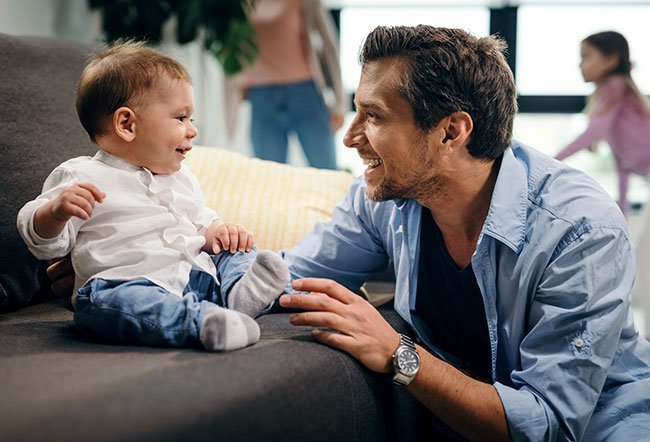When Do Babies Say Their First Word?
- Baby Talk Milestones
-
Parents Help
- How can you encourage your baby's speech and language development?
-
Risks and Concerns
- What are the causes for concern in a baby's speech development?

Parents might be anxious about their newborn’s speech and language development, and whether they’re hitting their milestones when they should.
A child’s first word is an essential step. Most babies utter their first word between 8 to 12 months of age, mostly around the time of their first birthday. Girls may say their first words earlier compared to boys.
What are voice, speech, and language?
Voice, speech, and language are the ways to communicate with each other.
- Voice: The sound is produced when air from the lungs is pushed between vocal folds present in the larynx (voice-box), causing them to vibrate.
- Speech: It involves talking, which is one way to communicate language. It involves the coordinated muscle actions of the tongue, lips, jaw, and vocal tract to produce familiar sounds that make up language.
- Language: It is a set of common rules that allow people to express their ideas in a significant way. Language may be expressed verbally or by writing, signing, or making other gestures, such as eye blinking or hand and mouth movements.
What should my child be able to do?
Baby talk milestones start around seven months. The table below shows the speech and language milestones between the age of 7 to 24 months.
| Seven months to one year |
|---|
|
|
|
|
|
|
|
|
| One to two years |
|
|
|
|
|
|
|
|
How can you encourage your baby’s speech and language development?
Parents play a pivotal role in their child’s speech development. Encourage your child by
- Respond to the child when they make noises.
- Talking to the baby clearly and slowly for them to understand the words.
- Teaching the child to imitate actions, such as peekaboo, clapping, blowing kisses, and waving bye-bye.
- Narrating to the child about what you are doing as you wash, dress, feed, and change them.
- Smiling and applauding even at the smallest or most confusing attempts at baby talk.
- Singing to the baby and reading to them beginning at a young age.
What are the causes for concern in a baby’s speech development?
Even if each child has their own pace of development, parents need to monitor their child’s progress. Parents should be concerned if the child does not
- Understand the words no, bye-bye, and bottle by the age of 15 months.
- Use single words by 15 to 16 months of age.
- Follow simple instructions by the time they turn 21 months.
- Use real words by the time they turn two years.
- Point to different body parts by the age of two years.
